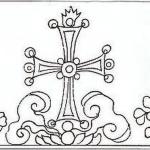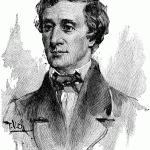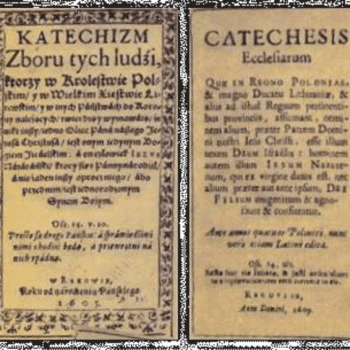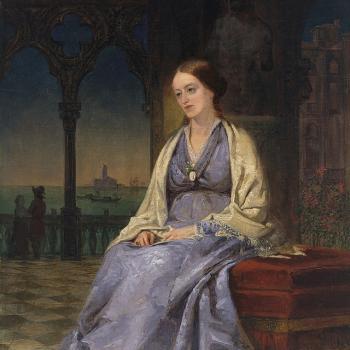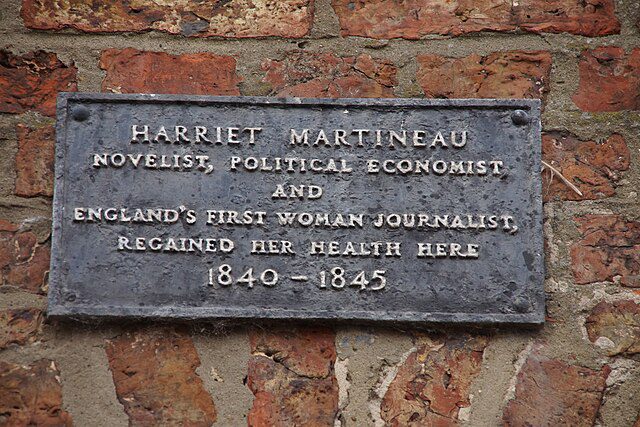
Plaque at Tynemouth
Harriet Martineau, British novelist, lecturer, abolitionist and theological thinker was born on the 12th of June, in 1802.
She was also a Unitarian, a naturalist, and, eventually an atheist. Her influences within the Unitarian world would be immeasurable.
She’s always been a favorite of mine. And I try to notice when this day rolls around…
The family were active English Unitarians of Huguenot descent, her father a deacon at the famed Octagon Chapel in Norwich. The family was comfortably middle class. As was common among Unitarians in that moment she was educated well beyond the cultural norms of the day.
Of her eight siblings, her closest was James who would become a leading light of the English Unitarian movement, occupying a space in English Unitarianism similar to William Ellery Channing in America.
Partially deaf from childhood, she was able to hear with an ear trumpet. Her sense of taste and smell were also compromised. Despite all this and along with some luck in tutors and teachers as well as, and no doubt principally, with a fierce tenacity, she grew to become a formidable intellectual.
Harriet Martineau was one of the singular figures of her generation.
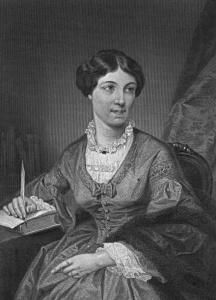
She wrote of herself that by fifteen she’d “become a political economist without knowing it.” This came to fruition in 1825 with the publication of her Illustrations of Political Economy. The book introduced the general public with the works of Thomas Malthus, James Mill, Adam Smith, and others. It is said this unlikely best seller outsold Dickens’ works at the time. With this and a lifetime of work following she is sometimes called the mother of Sociology.
The family business collapsed in 1829, and she embarked upon a career as a writer. As she would later comment
“Many and many a time since have we said that, but for that loss of money, we might have lived on in the ordinary provincial method of ladies with small means, sewing, and economizing, and growing narrower every year: whereas, by being thrown, while it was yet time, on our own resources, we have worked hard and usefully, won friends, reputation and independence, seen the world abundantly, abroad and at home, and, in short, have truly lived instead of vegetated.”
Between 1834 and 1836 she traveled throughout the Americas. Her acerbic comments on the American nation, especially as regarded slavery, included Society in America and Retrospect of Western Travel did not endear her on this side of the Atlantic.
But she also made some lasting connections among the rising Transcendentalists. She in fact introduced Margaret Fuller to Ralph Waldo Emerson. Martineau is also credited with pushing the young and brilliant Fuller beyond her early exclusive focus on women’s rights. Not losing sight of that, but seeing a bigger world. Which helped to make Fuller such an incredible figure in her own right.
From her visit to America Harriet Martineau has been counted among the English Transcendentalists.
As a thinker Harriet was heavily influenced first by John Locke and the Unitarian scientist Joseph Priestly, seeing the world in naturalistic terms and the intimate relationship between who we are and our experiences and situations in life. She saw it essential to critically examine all assumptions, including religious.
Martineau came to embrace the positivist philosophy of Auguste Compte. Not uncritically, she actively rejected his conservatisims especially regarding the place of women. In 1853 she she translated Comte’s Positive Philosophy into English.
As her theology evolved to an ever more naturalistic position she moved beyond even the broad contours of her Unitarian upbringing and gradually emerged as a free thinker and atheist. In her 1851 Letters on the Laws of Man’s Nature and Development Martineau would write
“How far happier it is to see — how much wiser to admit — that we know nothing what- ever about the matter! … how well it would be for us to set our minds free altogether, — to open them wide to evidence of what is true and what is not!”
An enormously interesting thinker and an important influence in the evolution of Unitarian thought as it moved to an ever more naturalistic posture.
Someone well worth remembering, and celebrating.



